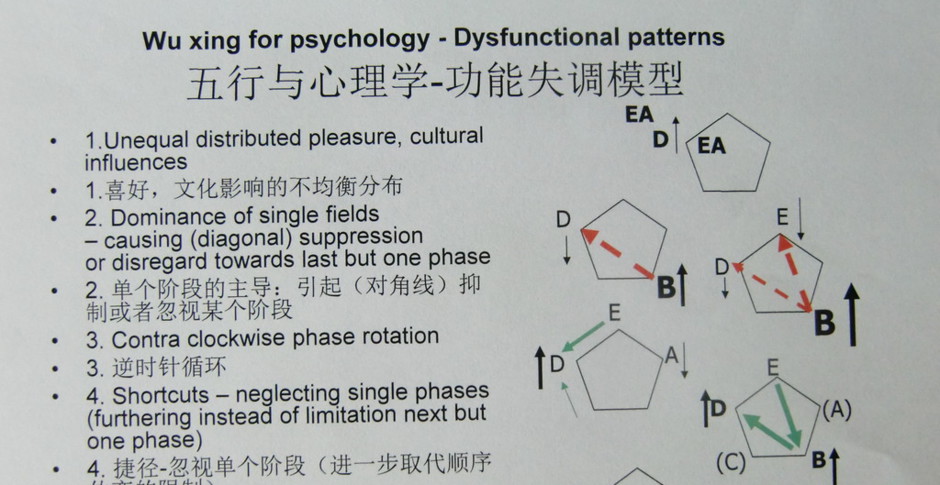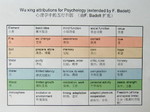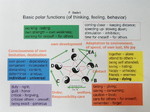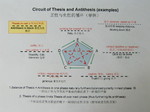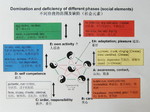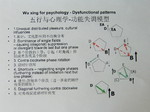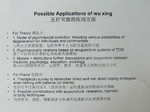Wu-xing for psychology (Bejing 2011)
To use wu xing in today`s psychology as an evolutionary concept it is necessary to extend it by:
- corresponding ideas, main social and cognitive functions and virtues (see picture 1).
- polar attributions concerning thinking, behavior and emotions (see picture 2 and 3),
- additional consideration of the elements` atmosphere according to the missing western element "air" with its inside aspects (own pleasure) and outise appearance (our environment)
Wu xing as a model of possible psychosocial evolution or failure
Evolution takes place when Balance of Thesis and Antithesis in one phase naturally furthers balanced polarity in the next phase (see picture 3).
Also the Tesis of a phase limits the Thesis of the over next phase - thus furthering its antithesis:
- Contact, empathy (Thesis phase A) limits critic, responsibility (Thesis phase C) thus furthering generosity (Antithesis phase C)
- Responsibility, critics (Thesis C) should limit personal work, effort, competition (Thesis E) and thus further rest, helping and cooperation (Antithesis phase E)
- personal effort, work, enables us to limit caution, storage of money and goods (Thesis B) and thus further trust, consumation
- Caution and property (Thesis B) should limit personal claims, desires (Thesis D) and thus further personal satisfacition, sometimes awareness of incompetence, dependency (all Antithesis of phase D)
- Personal wishes, claims, motivation (Thesis pase D) limit contacts, empathy and experiences (Thesis phase A) and thus help us to overlive alone, to detach (Antithesis phase A) thus bewaring us from obsessive bindings or phantasy (possible symptoms of phase A domination)
Wu-xing - dysfunctional patterns (see picture 5 above)
Clockwise versus contra clockwise rotation
|
Clockwise rotation: (furthering individual psychosociaö development) |
Contra clockwise rotation: (may delay individual psychosocial development)
|
|
Contact, emotions (Phase A) furthering care, caution, property (Phase B)
|
Activity (Phase E) primary based upon bad experiences, friendship or animosity (all Phase A); Contacts, experiences, emotions (A) primary due to care, caution, property (B) - instead due to own activity (Phase E) |
|
Care, caution, property (B) furthering (developing) order, critic, laws, responsibility (C) |
Care, caution, property (B) primary due to laws, order, critic, responsibility (C)
|
|
Critic, order, laws, responsibility (C) furthering (developing) own position, limits, claims, might (D) |
Critic, order responsibility, laws (C) primary due to own position, claims, might (D) |
|
Own position, claims, limits, might (D) furthering (developing) own work, effort, activity (E) |
Own position, limits, claims, might (D) primary due to own effort, competitive work (E) |
|
Own work, effort, activity (Phase E) in a suitable atmosphere (quality EA attributions - considering own life joy, right speed and right place) usually
furthering positive contact, emotions and experiences (A) or possibly (without suitable atmosphere) negative.
|
Own sudden work, effort, activity (E) primary due to contacts, experiences (A) - instead due to own competence, interests, desires; Activity, effort primary based on emotions without considering own atmosphere EA (own pleasure, suitable time, speed and place) |
Shortcuts: diagonal furthering instead of limitation
Neglecting a phase in between by diagonal furthering (instead of diagonal limitation) easily reduces the five phase’s system into a 4 or even 3 phases system, which is usually connected with psychosocial and political problems due to a few very dominating elements. Here some examples:
- Phase D furthering phase A (neglecting phase E) : Demanded love, happyness, contacts - neglecting suitable behaviour and activity.
- Phase E furthering phase B (neglecting phase A): Reckless competition mainly to further property (neglecting contacts, empathy, experiences)
- Phase A furthering phase C (neglecting phase B): Emotional criticism (neglecting care, collected experiences, material, facts, memory)
- Phase B furthering phase D (neglecting phase C): Own position and might (Phase D) primary due to property, money (phase B) – neglecting responsible evaluation, selection (phase C); Property (phase B) furthering more own wishes and claims (phase D) because of neglected responsibility (Phase C)
- Phase C furthering phase E (neglecting phase D): When strong accusing furthers force (neglecting might and limits of participants)
In all these cases it is of course necessary to strengthen the neglected parts – personally and if necessary also politically.
Possible Applications of wu-xing are listed up in picture 6.
More about dysfunctional patterns in life - explained with the help of the wu-xing system (like diagonal suppression, disregard, one sided cultural influences, mutual stimulation of neighbouring phases) as well as possible strategies against it you can read in my German book: “Psychosomatische Vorsorgemedizin” - see literature
